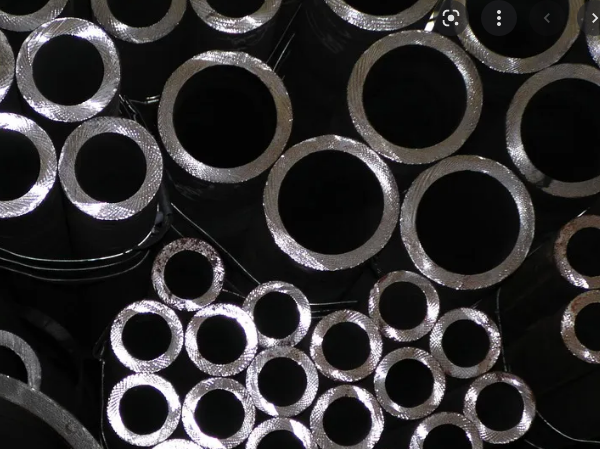
Black steel pipe (mild steel black pipe) is usually made of mild steel (low carbon steel), so it can be welded with most grades of steel. Although the term "black iron pipe" is sometimes used, it should be noted that it refers to low carbon steel, not cast iron.
Black mild steel pipe is widely used in vehicle manufacturing, mechanical parts manufacturing, tools, bearings and other fields. Due to its relatively good plasticity and toughness, it has excellent weldability and corrosion resistance.

What is black carbon steel pipe?
Black carbon steel pipe refers to steel pipe with a high carbon content, usually above 0.1%. Blackening is a type of oxidation treatment on the surface of steel, and is mainly applicable to carbon steel and low alloy steel. Blackening is to heat the workpiece in a highly concentrated alkali and oxidant solution (heating temperature is about 140°C, insulation for 1-2 hours) to form a dense Fe3O4 film on the surface of the steel.
The iron oxide film can isolate the air and prevent the internal oxidation of the steel, thereby achieving the purpose of corrosion resistance. Due to differences in operating methods and the chemical composition of the metal itself, the color of this film includes black, blue-black, brown, etc.
Uses of black carbon steel pipe:
Black carbon steel pipe is often used for natural gas or water pipes because it is low-cost and can be welded using common methods. Some long-distance oil pipelines also use black carbon steel pipes (such as black low-carbon steel pipes) because these pipes can be connected on site and are not easy to rust. This type of steel pipe can be used in climates or ground conditions that may accelerate corrosion, but may require additional protection, such as anodes. The anode is an embedded zinc rod that corrodes first when attached to the steel pipe.
Classification of black carbon steel pipes:
1. Seamless black carbon steel pipes
Seamless black carbon steel pipes are made by perforating solid steel billets into hollow cylindrical shapes. Since there are no welds, they are stronger and suitable for high-pressure applications.
2. Welded black carbon steel pipes
Welded black carbon steel pipes are cylindrical pipes formed by bending and welding steel plates or strips. They are a cost-effective alternative to seamless pipes and are commonly used in a variety of industrial and structural applications.
Advantages of black carbon steel pipes:
1. Corrosion resistance
Due to the oxide film on the surface of black carbon steel pipes, they have better corrosion resistance.
2. Beautiful appearance
The steel pipe is bright black in color, with a uniform surface color and beautiful appearance.
3. Wide range of uses
Black carbon steel is a type of steel with a high carbon content, usually between 0.3% and 2.0%. Due to its high carbon content, black carbon steel has high hardness and strength, as well as good toughness and ductility. This makes black carbon steel widely used in water and gas transportation, construction and machinery industries.
What are black steel pipes used for?
Other uses of black steel pipes include gas distribution inside and outside homes, water wells and sewage systems. However, black steel pipes are never used for transporting potable water due to the fact that they tend to corrode in water and mineral of the pipe will dissolve into the water and clog the line as well.
Typical applications:
Oil and gas transportation: buried and coated without anti-corrosion treatment
Fire protection system: building fire sprinkler main pipe
Building structure: scaffolding, steel structure frame
Machinery manufacturing: hydraulic cylinder, equipment support
How is black steel pipe different from other types of steel pipe?
There are two methods for producing black steel pipe, which can be made into welded pipe or seamless pipe. Both methods require the raw steel to be cast into an initial shape that is easier to process. The steel is then stretched into a seamless pipe, or the edges are pressed and sealed with welds to make a pipe. The earliest steel pipe production method appeared in the early 19th century and has gradually developed into today's modern production process.
1. Corrosion resistance
Black carbon steel pipe has good corrosion resistance due to a black oxide film on the surface. At room temperature, carbon steel pipe has poor corrosion resistance and is easily corroded by chemicals such as oxides, acids, and salts. Surface treatment of carbon steel pipe is one of the important measures to improve its corrosion resistance. Common surface treatment methods include electroplating, galvanizing, spraying, sandblasting, etc.
2. Price
Due to the black surface treatment of black carbon steel pipe, its cost is higher than that of ordinary carbon steel pipe.
Common standards and types:
ASTM A53: general black steel pipe (seamless/welded)
ASTM A106: seamless black steel pipe for high temperature
API 5L: pipeline pipe for oil and gas transportation
ASTM A500: structural pipe
Precautions for use:
Anti-corrosion requirements: anti-rust paint or anti-corrosion coating is required for outdoor use
Fluid compatibility: rust may occur when conveying water, it is recommended to be used for non-corrosive media
Fire certification: must comply with NFPA and other fire protection standards
Read more: Carbon Steel Galvanized Pipe VS Carbon Steel Black Pipe
